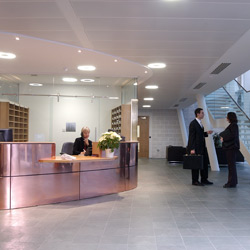Recent Stories
- Businesses urged to tap into science and technology young talent
- Digital relay baton enables remote crowd cheering of athletes
- Health Innovation Campus moves a step closer
- £7.1 million R&D boost for North West businesses
- Centre of excellence created for the next industrial revolution
- Artificial intelligence toolkit spots new child sexual abuse media online
- Strategic partnership set to help plug cyber security skills gap
- What your choice of smartphone says about you
- InfoLabTree: Discover the Story
- novi.digital Launch Event - 'An Event to Help Businesses Grow Online'
RSS Feeds
RSS feeds can deliver the latest InfoLab21 news and events direct to your browser without you having to visit the website.
In most browsers you can click on an RSS link and choose to subscribe to the feed to add it to your favourites or bookmarks.
University's Influence On Business Grows
Story supplied by LU Press Office
 InfoLab21 Reception
InfoLab21 Reception
Lancaster University has moved up the rankings to be placed in the top tier of colleges and universities in the UK which generate wealth through working with business.
The University's income from collaborative research with business rose from just under £7m in 2005/06 to over £11.5m in 2006/07 according to a Government report. Collaborative research is a crucial vehicle for universities to work with leading-edge innovators around the world.
The University was further ranked third in the country for the number and value of its contracts with small and medium-sized enterprises (SMEs) in 2006/07.
The help offered by the University to SMEs includes business consultancy to solve problems, professional training to improve skills and help to develop new products and services.
The report is published by the Government and the Higher Education Funding Council for England and looks at the contribution of universities and colleges to the wider economy, whether by the commercialization of new knowledge, training and development, consultancy or spin-off companies.
Strong Ties
Science and Innovation Minister, Ian Pearson, said: "Business and academia are forging strong ties, with collaborative research an important way of developing new technologies to help give this country the edge in an increasingly competitive world."
Lancaster University's success in generating income from business-related activity comes on the back of a survey commissioned by the University showing how it has boosted the regional economy.
Between 398 and 597 new jobs were created in enterprises supported by the University in the two years from January 2006 to December 2007. The average growth in employee numbers in organisations helped by the University ranged from between 12 and a half to 14 full time equivalent jobs. In the past six years, the University has supported more than 2,000 regional businesses, social enterprises and community organisations through a range of economic regeneration programmes.
The University has nine regional enterprise support centres: InfoLab21 (ICT Centre of Excellence), Lancaster University Management School - Institute for Entrepreneurship & Enterprise Development (IEED), Lancaster Environment Centre (LEC), Lancaster University Product Development Unit (LPDU), Lancaster Business Creation (LBC), Lancaster University Volunteering Unit (LUVU), the Tourism Centre, the Innovation & Enterprise Unit and the Centre for Employability Enterprise and Careers (CEEC). They are largely funded through the European Regional Development Fund (ERDF), the Higher Education Institution Fund (HEIF) and the Northwest Regional Development Agency (NWDA).
Mon 11 August 2008



